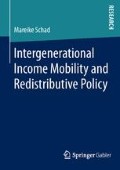Abstract
According to Piketty (1995), supporters of left-wing parties—characterized by favoring an extensive welfare state—are more represented in low-income classes and less represented in high-income classes. This voting pattern arises because of varying individual beliefs regarding the determinants of personal economic success. Individuals who put relatively much weight on self-determined rather than exogenously determined factors invest much in effort. In addition, they are more averse to redistributive policies than those putting more weight on exogenously determined factors.
Access this chapter
Tax calculation will be finalised at checkout
Purchases are for personal use only
Author information
Authors and Affiliations
Corresponding author
Rights and permissions
Copyright information
© 2016 Springer Fachmedien Wiesbaden
About this chapter
Cite this chapter
Schad, M. (2016). Conclusions. In: Intergenerational Income Mobility and Redistributive Policy. Springer Gabler, Wiesbaden. https://doi.org/10.1007/978-3-658-10465-8_11
Download citation
DOI: https://doi.org/10.1007/978-3-658-10465-8_11
Published:
Publisher Name: Springer Gabler, Wiesbaden
Print ISBN: 978-3-658-10464-1
Online ISBN: 978-3-658-10465-8
eBook Packages: Economics and FinanceEconomics and Finance (R0)

